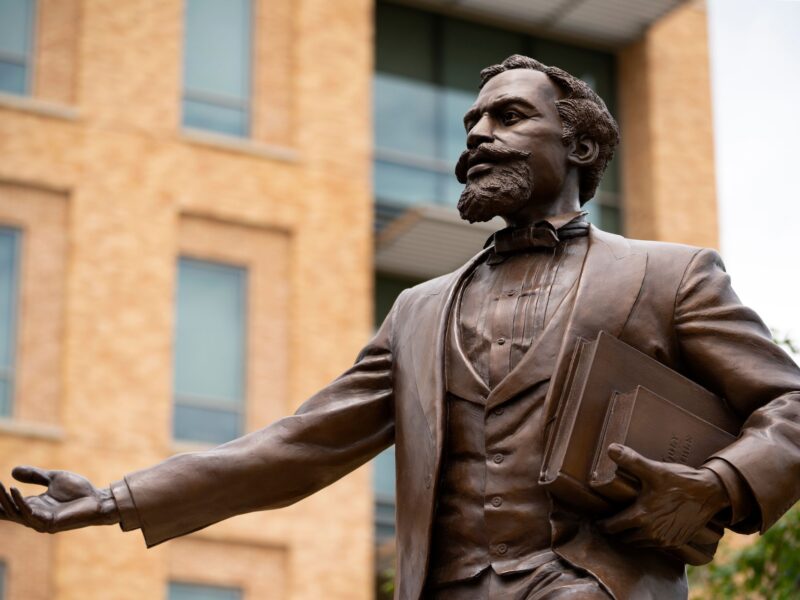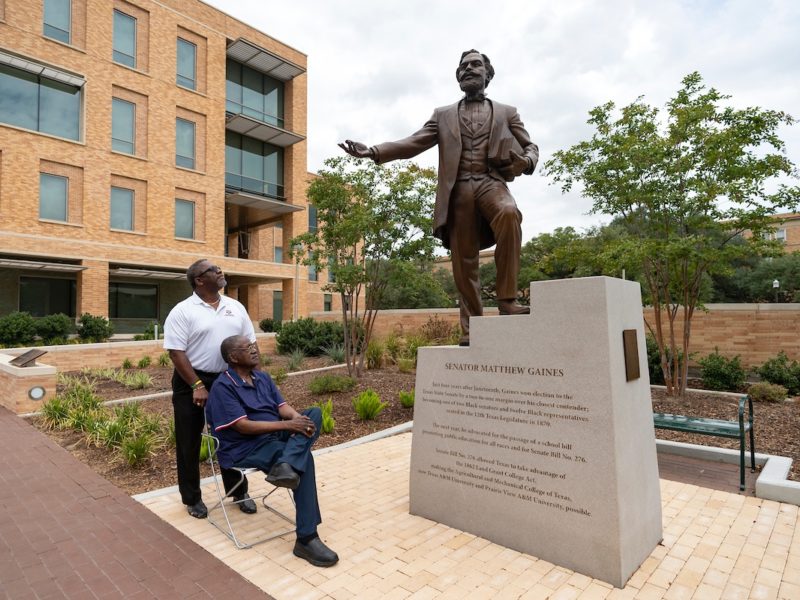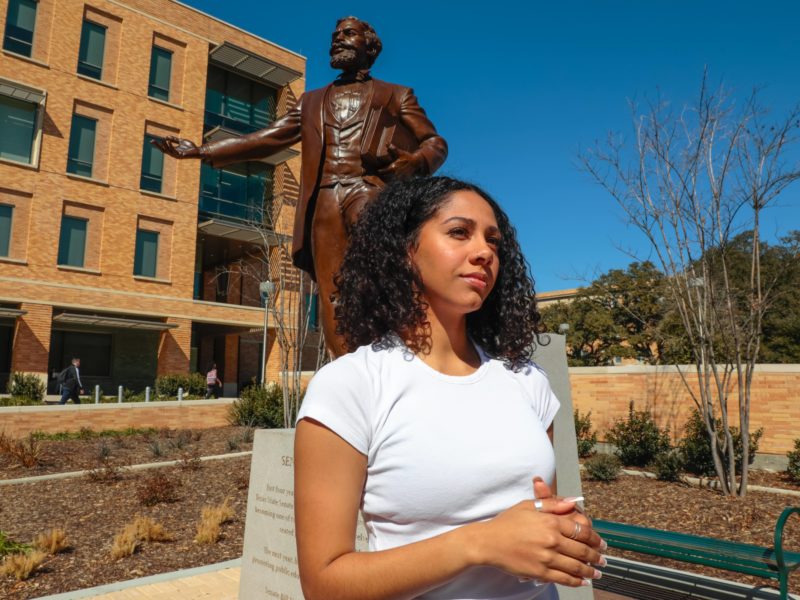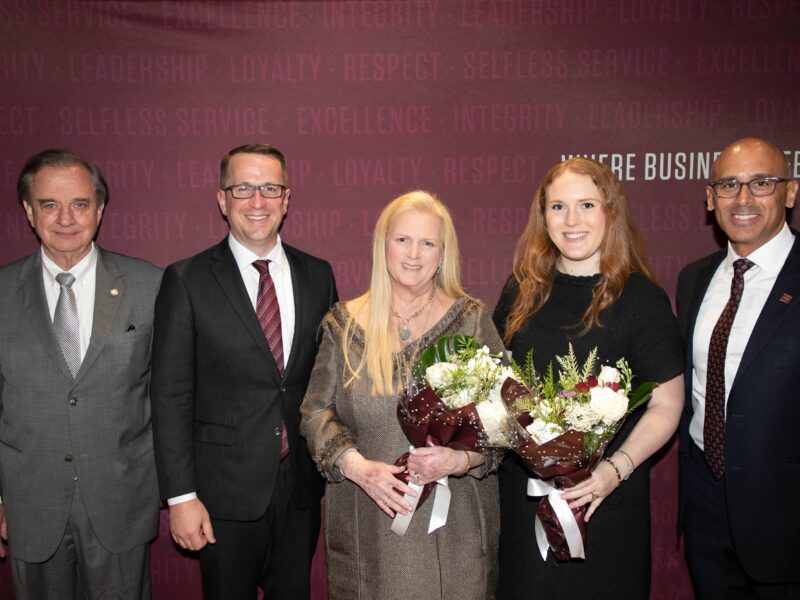Matthew Gaines Society Honors Key Figure In Texas A&M’s History
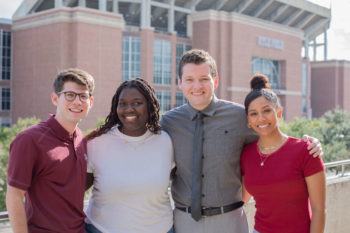
As Texas A&M University celebrates the dedication of the Matthew Gaines bronze statue on campus on Nov. 19 at 3 p.m., it’s appropriate that a spotlight be shown on the formation of the Matthew Gaines Society that helped make it all possible.
The group was instrumental in raising the $350,000 needed to build the statue and has helped raise local and statewide awareness of the background and contributions of Matthew Gaines.
The society was formed to honor Gaines, who was born in 1840 and was a Baptist minister and member of the Texas Legislature. Using the Morrill Act that formed the nation’s land-grant college system, Gaines helped in the creation of the Agricultural and Mechanical College of Texas, now known as Texas A&M.
The Matthew Gaines Society’s goal is to honor Gaines through leadership and development programs, student scholarships and recognizing individuals who make a difference at Texas A&M.
A few key factors that inspired the group’s leaders to join the society and work so hard to make the Gaines statue a reality are inclusion, representation, promoting change and bringing authentic change to Texas A&M.
“When first hearing about Sen. Matthew Gaines’ story and his connection to Texas A&M, I knew I wanted to be a part of something that would help ensure he gained the representation and acknowledgement he deserved on campus,” said Aketch Osamba, president of the Gaines Society and a senior public health major from Grand Prairie.
“His story is one that exemplifies how true public service and advocacy can promote change for thousands to come after you,” Osamba said. “In this case, the establishment of Texas A&M and Prairie View A&M has led to the education of thousands who Sen. Gaines may not have met but continues to help.”
Osamba added that it is rewarding not only to see the physical statue of Gaines on the campus, but also to envision how it will affect the campus culture and eventually lead to more conversations and dialogue about Gaines.
“I believe it is important for the Texas A&M community to know that the work of the Matthew Gaines Society is far from over,” Osamba said. “While we are elated to see the unveiling of the statue, we will continue to honor Sen. Gaines’ legacy throughout campus as we continue to work with students. To me, this is important as we continue to showcase how student-led initiatives can bring true change on campus.”
Sarah Hamilton, who served as an advisor to the Gaines Society before transitioning to the Texas A&M Foundation, said the concept of the society has been a thrilling and innovative journey. The hard work of the students has paid off in the culmination of the statue and the public recognition of Gaines and his ideals.
“It has been an inspiration to see the students in the Matthew Gaines Initiative — now called the Matthew Gaines Society — to reference and adhere to its mission before every action and any decision,” she said. “They have a clear sense of direction in knowing whether they should pursue a certain endeavor based on its alignment with inclusivity, belonging and making a lasting positive impact on the campus community. The primary goal of the initiative/society was to raise funds for a statue of the senator, but the group is now developing additional goals of enhancing leadership roles and creating student scholarships. This is the future vision for the Gaines Society that members are constructing as we speak.”
Peyton Liebler, a parks, recreation and tourism sciences major from San Antonio who serves as the art commemoration chair, said he was drawn to the mission of the society and its goals.
“I was interested in how this statue not only would celebrate Gaines’ contributions, but the contributions any Aggie has the potential to make regardless of their race, religion, background, gender, creed or many of the attributes that have historically been used to discriminate against people,” he said. “I truly was inspired by the idea that, while this statue celebrates and creates a huge point of representation for the Black community, it would stand as a symbol that anyone could truly accomplish anything. In Gaines’ lifetime, he went from slave to senator. That’s a transformation that may have seemed unlikely to him, but it happened and he made history because of it. And that’s why I wanted to get involved, to find a way in which I could support the people on this campus who want to transform their lives and make history.”
Breiana Degrate, a graduate student from DeSoto majoring in public policy analysis who serves as programming chair, said the Gaines Society got her attention because of the critical role he played in establishing Texas A&M. It’s a story that any African-American could be proud of, she noted.
“I believe the Gaines story is reflective of many African-American stories, and the integral figures in America whose leadership and stories have been diluted throughout history,” she said. “That is why joining the society for proper recognition of his work was important to me. Working with innovative student leaders, staff, and faculty here on campus toward this common goal has been extremely rewarding. However, actually being able to see the statue come into fruition has to be the most rewarding experience of my time in the society.”
New members of the society said that joining the group was something they deeply believed in because of its values and how it promotes more inclusion on campus.
“Sen. Gaines played a crucial role in the formation of Texas A&M and he should be commemorated on a larger scale,” said Samhita Anapu, a junior public health major from Houston. “I enjoy doing the little but foundational things like taking part in discussions about how to further expand Gaines’ legacy. I want students to know how important he was to the formation of Texas A&M and his crucial role in representing Black students.”
Those thoughts are echoed by Ariana Gonzalez, a sophomore political science major from Mission who said bringing attention to Gaines and his legacy is a top priority for all the group’s members.
“Being able to bring awareness of who Matthew Gaines was and the contributions he made to our university is incredibly satisfying since most people are hearing about him for the first time,” she said.“No matter who you are and your background, you can make a lasting impact, not just at Texas A&M but anywhere you are.”
Hunter Syas, a biomedical engineering major from Beaumont, said that hearing Gaines’ life story was an inspiration to him and his main reason for joining the group. He believes he was called to join the society.
“As a member, I can instill a positive impact within my community and our student body,” he said. “It’s heartwarming to know that so many people are dedicated to an incredibly empowering cause that will ripple throughout history and Texas A&M’s legacy. I would like for our students and former students to know that the Gaines Society embodies empowerment, change, and growth and that the statute will change our students’ confidence and perspective of what Texas A&M stands for. It will physically represent that a person of color’s voice matters, and when heard, it sparks brilliance across all peoples.”
Interested individuals can make an online donation to the Matthew Gaines Society to help further its mission and continue to fulfill the legacy of Gaines. For more information about giving, contact Sarah Hamilton ’22, assistant director of development, at shamilton@txamfoundation.com.
Media contact: Sondra White, 979-315-2557, sondra@tamu.edu
